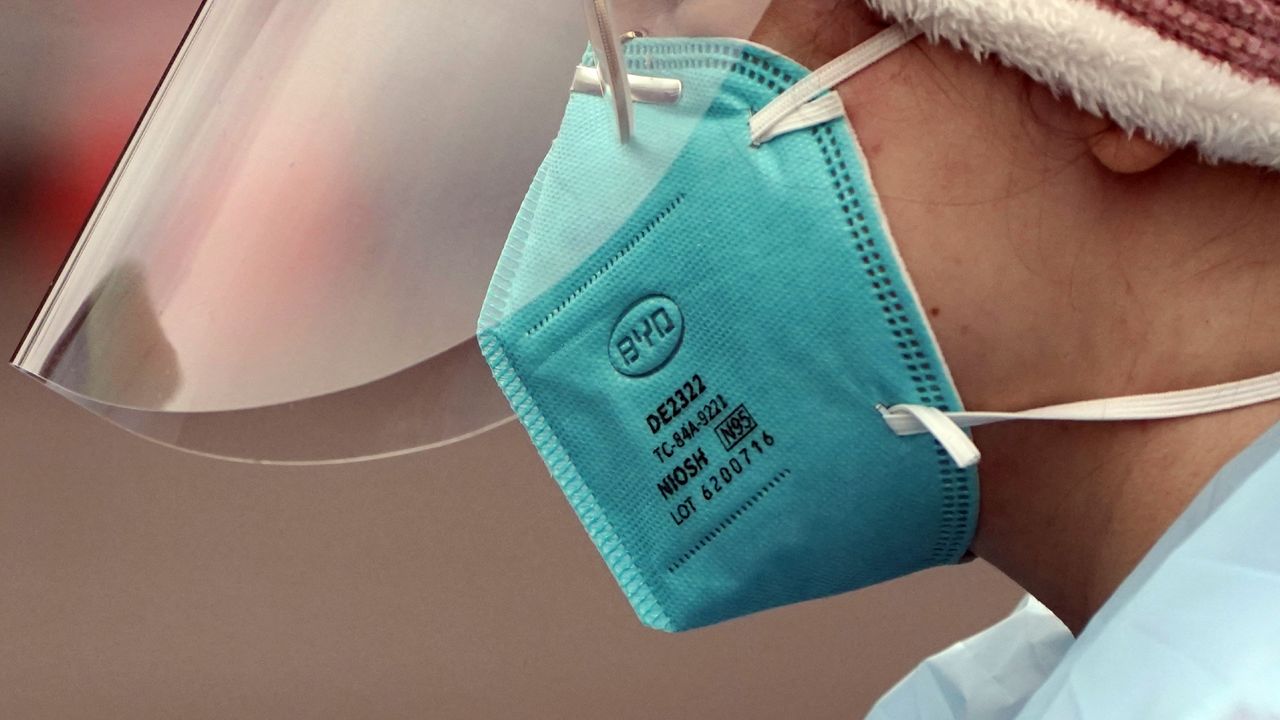As the omicron variant of COVID-19 has raced across the world, emerging data from a number of studies indicate that cloth masks might not be as effective in preventing transmission of the highly-contagious variant as for previous strains of the virus.
Recent data has shown that the highly-transmissible omicron variant, with its numerous mutations, may have smaller particles that can further evade protection from cloth masks.
“Researchers are still pinpointing exactly how much more infectious omicron is than its predecessors, but at this point, it’s clear that omicron is indeed more infectious — which means we all need to be taking additional precautions,” infectious disease expert Dr. Steven Gordon told the Cleveland Clinic in a late-December interview.
Preliminary research from a study at Northeastern University found that COVID-19 particle leakage varies – for both cloth and N95 masks – depending on a number of factors including style, fit and material used, but the effect is much more pronounced in non-surgical masks.
“Fabric masks have highly variable results, from less than 30% to nearly 90% particle removal efficiencies when worn as designed,” the research found in part.
While proper fit also impacts the efficacy of N95 masks, researchers found that particle removal efficiency decreased from around 99% for well-worn N95-wearers to just about 90% when poorly fitted.
Another early study came from researchers at the University of Hong Kong, which found that the omicron variant multiplies 70 times faster in the bronchial tract than previous iterations of the virus. Those findings are not yet peer-reviewed, but a separate study published in mid-December supports similar conclusions.
The latter study found that omicron was four times more infectious than the original strain of COVID-19, and twice as transmissible as the delta variant.
The study’s lead author, Wilfredo Garcia-Beltran, told NPR that while it’s still “a very far-out interpretation” to say that omicron can more easily evade certain kinds of masks and thus infect individuals at a lower dose, "it will probably pan out that way, given that we're looking at a variant with more efficient entry into human cells."
While much of the data remains preliminary, a growing group of medical professionals are encouraging the CDC to update its guidance to strengthen recommendations surrounding N95 or KN95 masks.
The Mayo Clinic, which requires all visitors wear masks, recommends the use of surgical/procedural masks or ventless N95 face coverings, although cloth masks are still acceptable when worn properly.
And on Wednesday, the University of Arizona updated its guidance to say cloth masks “no longer meet the face covering requirement.”
The school now requires students and faculty to use surgical-grade masks, like the N95, while on campus.
“However, you may combine a cloth mask (top layer) and a surgical mask (bottom layer) to improve fit and increase protection,” the announcement added. “These requirements apply to all faculty, staff, students, designated campus colleagues and visitors to the University of Arizona campuses or locations.”
Currently, the Centers for Disease Control and Prevention recommends that all individuals over the age of two should wear a mask in indoor public settings, particularly for unvaccinated or not-fully vaccinated individuals, people with weakened immune systems and in areas of high transmission.
The CDC does not, however, recommend one particular type of mask over another, saying both cloth and disposable masks – when worn properly – effectively prevent transmission of COVID-19.
The CDC’s most recent guidance says that, in certain situations and when supply is available, individuals may “choose to use a basic disposable N95 respirator for personal use, instead of a mask,” but maintains that “specially labeled ‘surgical’ N95 respirators should be prioritized for healthcare personnel.”
When asked if the CDC plans to update their guidance in light of recent reports surrounding the transmissibility of the omicron variant, an agency spokesperson pointed Spectrum News to the CDC’s guidance updated on Oct. 25, 2021.
Some experts, like Dr. Leana Wen, a professor at the George Washington University Milken Institute School of Public Health, called the CDC’s guidance a mistake.
"Cloth masks are little more than facial decorations. There's no place for them in light of Omicron," Wen, a medical analyst for CNN, said on CNN Newsroom Tuesday. “We need to be wearing at least a three-ply surgical mask … You can wear a cloth mask on top of that, but do not just wear a cloth mask alone.”
Still, data showing that N95 respirators – surgical-grade face masks that are approved by the National Institute for Occupational Safety and Health – are more effective than cloth masks at preventing transmission of COVID-19 is hardly new.
For example, a study from Duke University published in September 2020 found that properly-fitted N95 masks, which suction to the face, were most effective at preventing particle transmission from individuals wearing the face covering. In close second were properly-worn surgical masks.








_crop)